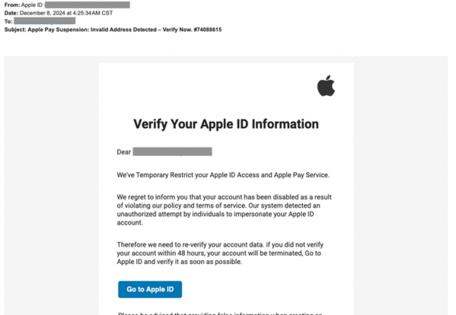Jim Rossman: Read your messages closely and don’t click those links
Published in Science & Technology News
I received a text from my mom before 8 a.m. today.
“Jim, is this a scam?”
She attached a screenshot of an email she’d received earlier. The email looked like it was from Apple. The subject was: Apple Pay Suspension: Invalid Address Detected.
It read, “Verify Your Apple ID Information,” followed by “We’ve Temporary Restrict your Apple ID Access and Apple Pay Service.”
My first instinct was SCAM. I was right.
The first clue was the bad grammar in the first line. It really did say “We’ve Temporary Restrict your Apple ID Access…”
The message continued, “We regret to inform you t͏hat your account has b͏een disabled as a result of violating our policy and terms of s͏ervice. Our system detected an unauthorized attempt by individuals to impersonate your AppIe ID account.”
Below was a blue button labeled “Go to Apple ID”
I had mom forward the actual email message to me. Her original query just had a screenshot of her mail window, just showing me the first few paragraphs.
When I received the email, the header information showed the return address was an address that ended in @minilib.net.
The button to supposedly change your Apple ID information supplied in the email took me to a page that had already been taken down.
Mom had a suspicion the message was fake because she doesn’t use Apple Pay and doesn’t have a payment method stored for her Apple account.
Coincidentally, mom also received an actual email from Apple the following day.
The second message really was from Apple. It read, “Let’s check up on your Apple Account.”
This message was full of reminders on how users can keep their Apple account safe. Instead of some random domain, this message came from apple.com and it included links to help you learn about the various ways you can keep your Apple account secured, including links to show you how to keep your contact information up-to-date, how to reset your password and how to set up a legacy contact, who is someone you can designate to access your iCloud files after your death.
The takeaway today is please don’t click on links in random emails, even if they sound menacing. In this case, you might go check on your Apple account by logging in through your iPhone or Mac and not using any links in the email.
The same advice goes for messages that look like they come from Google or your bank or anywhere else where you might have your account information stolen.
©2024 Tribune Content Agency, LLC.







Comments